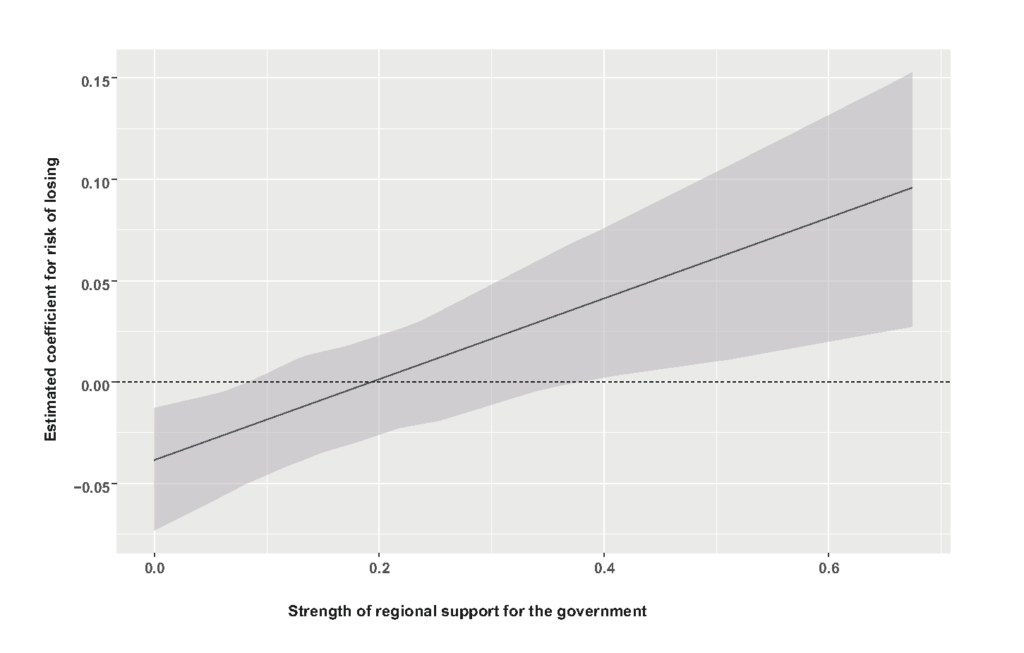When do central governments decentralise? When it benefits the party in power
Though many European countries have increasingly decentralised power to regional governments, the trend is not necessarily uniform between regions within one country. In a comparative study of this heterogeneous decentralisation, Sofia Collignon finds that the desire of a central party to retain power in its regional strongholds is a significant factor in explaining regional variation.

Catalan and Scotland flags together during the Scotland Independence referendum. Picture: byronv2 via a (CC BY-NC 2.0) licence
Decentralisation has become commonplace in Europe. Between 1990 and 2006, more than half of European Union member states experienced some form of power redistribution. For instance, in the United Kingdom, Westminster devolved significant decision-making power to Scotland, Wales and Northern Ireland, giving each jurisdiction its own Parliament or Assembly.
However, not all EU members have decentralised and the timing and depth of the reforms varies significantly between countries and regions. For example, countries such as Slovenia have not formally redistributed any power, while in Spain, supporters of decentralisation have created regional legislatures to give more political autonomy in almost all aspects of policy-making to the Basque Country and Catalonia, while there is considerable variation in other regions’ autonomy. Why would central governments give up power and transfer it to the regions and why do some regions benefit more than others from such changes?
The dynamics behind decentralisation
The literature has long argued for two main explanations for this phenomenon. Structural explanations focus on the effects of economic development, country size, population, colonial history and ethnic diversity on the constitutional arrangements of power redistribution. Political explanations recognise that redistribution of power and resources is linked to political actors, either as the context in which they engage or as a by-product of their interactions (see for example, Hooghe et al; Treisman; Chhibber and Kollman; O’Neil). This scholarly work does a very good job at explaining why some countries choose a multilevel structure of government and to explain general homogeneous changes of distribution of power. But the question of why some regions of the same country get to be more powerful than others remain unanswered.
The study of differences within regions of the same country is more accurately represented by the literature on asymmetric federalism. This body of research argues that variation in the redistribution of power and resources between regions is introduced as a result of demands by regionalist parties addressing regional cleavages. This explanation convincingly addresses asymmetric devolution in a limited number of cases, such as Spain, Belgium and the UK (see for example, Agranoff; Moreno, Hombrado). But what about decentralisation in countries where regionalist parties haven’t been particularly successful or do not exist at all, such as Austria or Norway? Why do governments decentralise when there is no demand to do so? How do they decide which regions to empower more than others?
In a recent paper I take steps to address these questions. I suggest that heterogeneous decentralisation occurs when it is beneficial for the party in government, despite or regardless of the power held by regionalist parties. When the risk of future electoral defeat increases, the party in government decentralises to its sub-national enclaves in order to accumulate power and resources in the case of national electoral defeat. This argument expands and builds upon that of O’Neill (2003). However, I explicitly recognise that that parties are indeed risk-averse organisations and it is this risk that motivates them to decentralise, and target certain regions to benefit more than others.
The empirical evidence
I tested the argument on a sample that includes 15 European countries and their 141 regions. Heterogeneous decentralisation is calculated using separate values of regional tax revenue using regional data available by the OECD. The government’s risk of leaving office is operationalised as the probability of the government losing the next election given a set of political institutions and exogenous factors. Sub-national support for the government is measured using the vote share of the government party in the regional election. I also included in the models some regional and national controls to test for alternative explanations.
Lessons learned
Parties in government use decentralisation as a pre-emptive strategy to address the risk of losing the national government. When the risk of electoral defeat increases, the party in government targets decentralisation towards those regions where it is strong. As it can be appreciated in figure 1, these regional enclaves will have, on average, a share of taxes less subsidies approximately 26% larger than their counterparts. This effect holds even when we include other economic variables in the model.
Figure 1: Variation in the effect of government’s risk of future electoral defeat by the strength of regional support for the government

The pressure created by regionalist parties to transfer power to their regions does not motivate targeted decentralisation. Heterogeneous decentralisation is not targeted in regions where regionalist parties are strong. This indicates explanations of decentralisation and asymmetric federalism that are based solely on the strength of regionalist parties should be enriched to account for changes in decentralisation that occurred in a wider set of countries.
No evidence was found supporting previous claims that population, unemployment and district magnitude shape decentralisation.
There are important implications for the quality of democracy that can derive from these findings. The most relevant is that the risk of future electoral defeat creates incentives for parties in government to engage in decentralisation. It has been shown that when electoral competition is high, the government can agree on devolving power to regions. Such moments of high uncertainty can be capitalised by the opposition as well to put forward other important policy reforms in the agenda.
This post represents the views of the author and not those of Democratic Audit.
It draws on the author’s article ‘Governments, decentralisation, and the risk of electoral defeat’, published in Western European Politics.
About the author
Sofia Collignon is Lecturer in Political Communication in the Department of Politics and International Relations at Royal Holloway, University of London. Her research interests include the study of candidates, elections and parties in multilevel settings and the role of framing contests in the formation of public opinion.





 Democratic Audit's core funding is provided by the Joseph Rowntree Charitable Trust. Additional funding is provided by the London School of Economics.
Democratic Audit's core funding is provided by the Joseph Rowntree Charitable Trust. Additional funding is provided by the London School of Economics.
[…] Collignon, When do central governments decentralise? When it benefits the party in power, Democratic […]